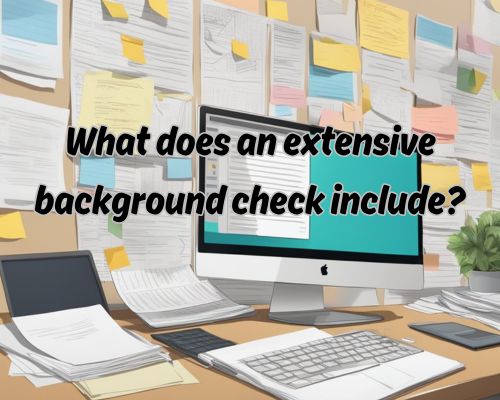What Does an Extensive Background Check Include? Key Components Explained

What Does an Extensive Background Check Include? Key Components Explained
When you’re engaging in the hiring process, understanding what an extensive background check includes is crucial.
Such checks often go beyond the typical evaluation of a candidate’s qualifications, offering a more comprehensive assessment of their history.
An extensive background check includes verification of educational experience, employment history, professional licenses, certifications, and a thorough criminal record review.

Incorporating additional elements in background searches helps verify identity and confirm that candidates have the experiences and qualifications they claim.
This thorough vetting process aims to prevent potential liabilities and ensures that employers make informed hiring decisions.
As an employer or job seeker, knowing the components of these investigations can prepare you for what’s ahead and help manage expectations.
With an increase in regulatory compliance, such as Social Security verification and address history checks, understanding each layer of these checks becomes indispensable for both parties involved in the recruitment process.
Components of an Extensive Background Check
Extensive background checks encompass several key areas critical for ensuring a thorough evaluation.
These components offer crucial insights into a job applicant’s past, helping employers make informed hiring decisions. See https://privateinvestigatorwestpalmbeach.com/ for more.
Identity and Address Verification
Identity verification is a foundational element of a comprehensive background check.
It typically involves confirming personal details such as full name, date of birth, and Social Security number.
This process helps to ensure that the applicant’s identity is legitimate and matches the details provided.
Address history verification complements identity checks by analyzing past and current addresses.
Confirming this information helps in understanding an individual’s residential stability and history.
This information is particularly useful when seeking to validate other components of the background check, such as criminal record searches.
Criminal Records and History Review
A thorough criminal background check is a vital component for assessing the suitability of a job applicant.
This includes local, state, and often national criminal database searches to identify any past convictions or ongoing legal issues.
The review may include specific inquiries into sex offender registries and other legal databases.
Validating criminal history ensures that employers can assess potential risks and maintain a safe workplace, particularly in positions involving vulnerable populations or handling sensitive information.
This thorough review provides deeper insights into the character and legal history of potential employees.
Education and Employment Verification
Education and employment history verification are crucial steps in a comprehensive background check.
They confirm the accuracy of the applicant’s claimed educational qualifications and employment history.
This involves contacting educational institutions to validate degrees and certifications the applicant claims to have obtained.
Employment verification further involves confirming past job titles, responsibilities, and tenures through direct contact with previous employers or through reference checks.
An accurate record of past employment assists in establishing the applicant’s professional background and capabilities, ensuring they meet the necessary requirements for the job.
Credit and Financial Checks
Credit checks provide valuable insights into an applicant’s financial responsibility and stability.
Reviewing an applicant’s credit report helps identify any patterns of financial mismanagement, such as significant debts, delinquencies, or bankruptcy filings.
Understanding an applicant’s financial standing through credit history check is especially relevant for positions handling financial transactions or sensitive information.
It may include analysis of liabilities, assets, and overall credit score, offering a comprehensive view of their financial background and potential risk factors.
Legal Compliance and Reporting
When conducting extensive background checks, adherence to legal standards and reporting procedures is essential.
This ensures that the information gathered is used ethically and legally, supporting informed hiring decisions while maintaining workplace safety and trustworthiness. Get to visit https://privateinvestigatorwestpalmbeach.com/, to know more.
Fair Credit Reporting Act (FCRA) Compliance
The Fair Credit Reporting Act (FCRA) is pivotal in regulating how consumer information is collected and used.
When conducting background reports, you must obtain written consent from the candidates before accessing their records.
Providing a copy of the report to the candidate is also vital.
This step allows the candidate to address any inaccuracies.
Compliance with FCRA ensures that the hiring process remains transparent and fair, reducing potential legal risks and fostering a fair workplace environment.
Industry-Specific Regulations and Security Clearance
In certain industries, you may need to follow specific regulations beyond the FCRA, especially for roles involving sensitive positions.
Security clearance requirements often apply in fields like defense or government, ensuring that individuals with access to sensitive information are thoroughly vetted.
Such checks may include drug testing, driving records, and professional history reviews.
By aligning with industry-specific requirements, you maintain safety and security, supporting an environment of trust and reliability.
This practice is essential for sustaining company integrity and meeting sector standards.



